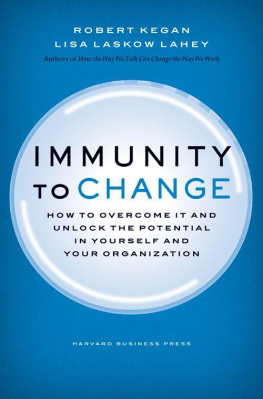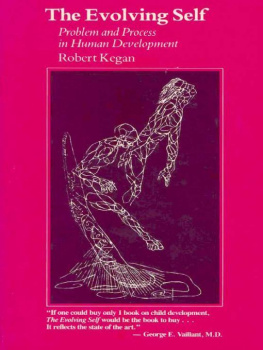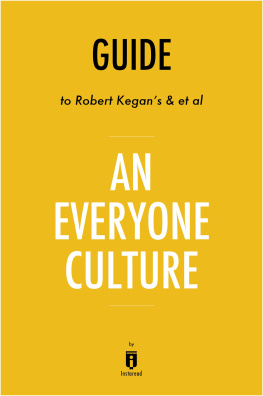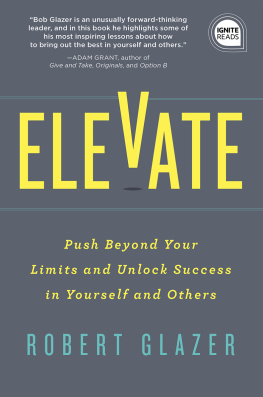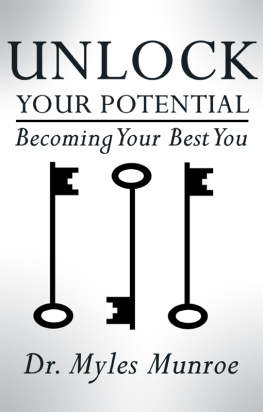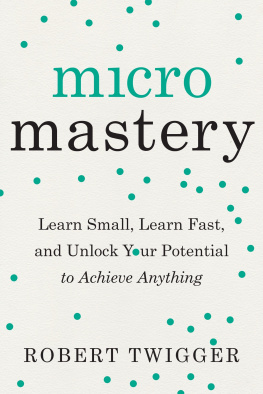Robert Kegan - Immunity to change: how to overcome it and unlock potential in yourself and your organization
Here you can read online Robert Kegan - Immunity to change: how to overcome it and unlock potential in yourself and your organization full text of the book (entire story) in english for free. Download pdf and epub, get meaning, cover and reviews about this ebook. City: Boston, Mass., year: 2009, publisher: Harvard Business Press, genre: Business. Description of the work, (preface) as well as reviews are available. Best literature library LitArk.com created for fans of good reading and offers a wide selection of genres:
Romance novel
Science fiction
Adventure
Detective
Science
History
Home and family
Prose
Art
Politics
Computer
Non-fiction
Religion
Business
Children
Humor
Choose a favorite category and find really read worthwhile books. Enjoy immersion in the world of imagination, feel the emotions of the characters or learn something new for yourself, make an fascinating discovery.
- Book:Immunity to change: how to overcome it and unlock potential in yourself and your organization
- Author:
- Publisher:Harvard Business Press
- Genre:
- Year:2009
- City:Boston, Mass.
- Rating:3 / 5
- Favourites:Add to favourites
- Your mark:
- 60
- 1
- 2
- 3
- 4
- 5
Immunity to change: how to overcome it and unlock potential in yourself and your organization: summary, description and annotation
We offer to read an annotation, description, summary or preface (depends on what the author of the book "Immunity to change: how to overcome it and unlock potential in yourself and your organization" wrote himself). If you haven't found the necessary information about the book — write in the comments, we will try to find it.
Robert Kegan: author's other books
Who wrote Immunity to change: how to overcome it and unlock potential in yourself and your organization? Find out the surname, the name of the author of the book and a list of all author's works by series.
Immunity to change: how to overcome it and unlock potential in yourself and your organization — read online for free the complete book (whole text) full work
Below is the text of the book, divided by pages. System saving the place of the last page read, allows you to conveniently read the book "Immunity to change: how to overcome it and unlock potential in yourself and your organization" online for free, without having to search again every time where you left off. Put a bookmark, and you can go to the page where you finished reading at any time.
Font size:
Interval:
Bookmark:

The Leadership for the Common Good series represents a partnership
between Harvard Business Press and the
Center for Public Leadership at Harvard Universitys
John F. Kennedy School of Government. Books in the series aim
to provoke conversations about the role of leaders in business,
government, and society, to enrich leadership theory and
enhance leadership practice, and to set the agenda for
defining effective leadership in the future.
Changing Minds
by Howard Gardner
Predictable Surprises
by Max H. Bazerman and
Michael D. Watkins
Bad Leadership
by Barbara Kellerman
Many Unhappy Returns
by Charles O. Rossotti
Leading Through Conflict
by Mark Gerzon
Senior Leadership Teams
by Ruth Wageman,
Debra A. Nunes, James A. Burruss,
and J. Richard Hackman.
Five Minds for the Future
by Howard Gardner
The Leaders We Need
by Michael Maccoby
Through the Labyrinth
by Alice H. Eagly and
Linda L. Carli
The Power of
Unreasonable People
by John Elkington and
Pamela Hartigan
Followership
by Barbara Kellerman
Copyright 2009 Harvard Business School Publishing Corporation
All rights reserved
No part of this publication may be reproduced, stored in, or introduced into a retrieval system, or transmitted, in any form or by any means (electronic, mechanical, photocopying, recording, or otherwise), without the prior permission of the publisher. Requests for permission should be directed to permissions@hbsp. harvard.edu or mailed to Permissions, Harvard Business School Publishing, 60 Harvard Way, Boston, Massachusetts 02163.
First eBook Edition: March 2009
ISBN: 978-1-4221-1736-1
For Bernard and Saralee Kegan
For my guys, Bill, Zach, and Max Lahey
CONTENTS
PART I
UNCOVERING A HIDDEN DYNAMIC IN
THE CHALLENGE OF CHANGE
ONE
Reconceiving the Challenge of Change
TWO
Uncovering the Immunity to Change
THREE
We Never Had a Language for It
Engaging the Emotional Life of the Organization
PART II
OVERCOMING THE IMMUNITY TO CHANGE IN
ORGANIZATIONS, INDIVIDUALS, AND TEAMS
FOUR
Overcoming the Groupwide Immunity to Change
A Collective Approach
FIVE
David Doesnt Delegate
Overcoming an Individuals Immunity to Change
SIX
Cathy Cant Contain Herself
Overcoming an Individuals Immunity to Change
SEVEN
The Case of Nascent Pharmaceuticals
Overcoming Individual Immunities to Help a Team Succeed
PART III
OVER TO YOU: DIAGNOSING AND OVERCOMING
IMMUNITIES IN YOURSELF AND YOUR ORGANIZATION
EIGHT
Unlocking Potential
Three Necessary Ingredients
NINE
Diagnosing Your Own Immunity to Change
TEN
Overcoming Your Immunity to Change
ELEVEN
Surfacing Your Collective Immunity to Change
CONCLUSION
Growing Your Own
How to Lead So People Develop
This book has literally taken us our whole professional lives to write. Advance reviewers say you will find here an entirely novel but thoroughly road-tested approach to bringing about significant improvements in individuals and groups in the workplace.
Well, its true that our road is well paved: The ideas and practices you will learn about here have been put to good use by a national railway in Europe, an international financial services company, one of Americas most admired technology companies, the leadership of a statewide child welfare agency, superintendents and their principals in several U.S. school districts, senior partners in the worlds leading international strategy consulting firm, and the fastest-growing labor union in America.
But it has also been a winding road, and to tell the truth, we didnt set out originally to work on the problem we are now getting credit for solvinghow to close the gap between what people genuinely intend to do and what they are actually able to bring about. Twenty-five years ago we would have been of little use to these organizations. Though we knew then we were on a trail worth a lifetime of exploration, we had no idea or plan that it would bring us to leaders and their teams in public and private sectors in the United States, Europe, Asia, and Africa.
We began as academic psychologists researching the development of mindsets and mental complexity in adulthood. With one of us (Kegan) taking the lead in the development of a new theory, and the other (Lahey) taking the lead in developing the research method and assessment procedures to test and refine it, we proceeded, in the 1980s, to uncover something that has been fascinating usand fellow researchers and practitioners all over the worldever since.
We discovered the possibility of life after adolescence! Despite the popularand, at that time, even scientificbelief that our minds, like our bodies, dont get any taller after adolescence, we found that some of our adult research subjects were able to evolve whole patterns of increasingly complex and agile ways of apprehending the world.
While few attained the most advanced growth patterns our investigations revealed, it was apparent through longitudinal research (carefully assessing and reassessing the same people over many years) that when people did evolve it was always in the same sequence. Each new mental plateau gradually overcame the systematic limitations of the prior one. Further research eventually demonstrated that each qualitative leap forward enhances not only peoples ability to see (into themselves and their world) but to act more effectively as well. (You will learn more about these mental plateaus in the first chapter of this book.)
But we also saw that many people did not evolve a whole new mental system after adolescence, and if they moved at all it wasnt far. Since we have always been educators at heart (and have spent our university lives not in a school of management, but a school of education), we wanted to know whether one could do anything to support these shifts in the expansiveness and complexity of our mindsets. Were such advances just a matter of fate and random variation, completely out of our hands? Or could people actually be helped to grow? This took us further down our road, throughout the 1990s, and led us to a second discovery.
We had been studying the evolution of mental development from the outside, as it were, seeking to describe the structure of each way of meaning-making, why it created the reality it did, what changed in a structure when it evolved. But now, without our quite realizing it, we were finding our way into the inner dynamics, in particular a sort of master motive that keeps us on our current plateau. We uncovered a phenomenon we call the immunity to change, a heretofore hidden dynamic that actively (and brilliantly) prevents us from changing because of its devotion to preserving our existing way of making meaning.
We first introduced readers to the concept of immunity to change in our 2001 book, How the Way We Talk Can Change the Way We Work. There we presented a deceptively simple processdistilled and refined over many yearsby which people can uncover the hidden motivations and beliefs that prevent them from making the very changes they know they should make and very much want to make (whether the goal is being more courageous in my communications or losing weight).
The reception to that book has been enormously gratifying, as it has been to watch what happens when we personally guide people (now several thousand a year) through this process (as we will guide you, if you wish, in chapter 9). They repeatedly say things like, I never saw that coming! and I got more out of that in three hours than three years in therapy! But the truth is, what people are raving about is the power and clarity of a new
Next pageFont size:
Interval:
Bookmark:
Similar books «Immunity to change: how to overcome it and unlock potential in yourself and your organization»
Look at similar books to Immunity to change: how to overcome it and unlock potential in yourself and your organization. We have selected literature similar in name and meaning in the hope of providing readers with more options to find new, interesting, not yet read works.
Discussion, reviews of the book Immunity to change: how to overcome it and unlock potential in yourself and your organization and just readers' own opinions. Leave your comments, write what you think about the work, its meaning or the main characters. Specify what exactly you liked and what you didn't like, and why you think so.

